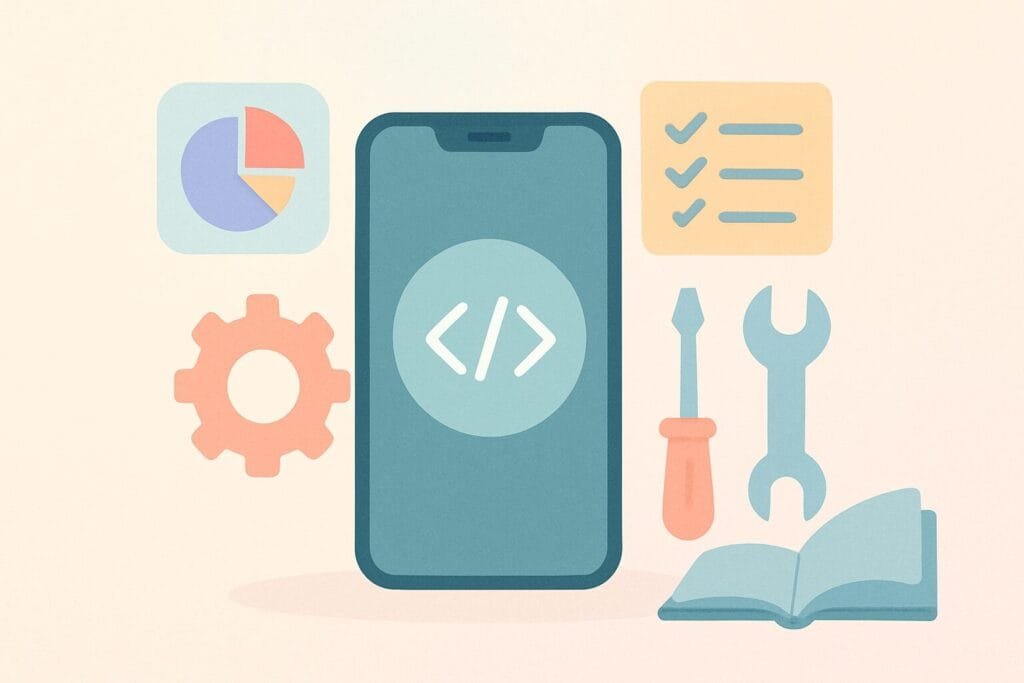In today’s fast-paced digital landscape, app developers constantly seek powerful, reliable, and free tools to improve productivity, ensure quality, and reduce development time. Whether you’re an Android, iOS, or cross-platform developer, the right tools can make a huge difference in how efficiently and effectively you build your app.
In this article, we’ll explore the top free tools that every app developer should know in 2025. These tools are categorized based on different stages of development—design, coding, testing, analytics, and collaboration.

1. Design & Prototyping Tools
Before writing a single line of code, you need a good blueprint. Design and prototyping tools help visualize the UI/UX and create interactive mockups for early feedback.
| Tool Name | Platform | Key Features | Best For |
|---|---|---|---|
| Figma | Web, Windows, Mac | Real-time collaboration, UI Kits | UI/UX design |
| Penpot | Web | Open-source, cross-platform | Free alternative to Figma |
| Adobe XD | Windows, Mac | Auto-animate, voice prototyping | Professional design |
Figma remains the most popular due to its cloud-based nature and strong collaboration features. For open-source fans, Penpot is an impressive alternative that is gaining traction.
2. Code Editors & IDEs
The heart of development lies in code. Here are the best free IDEs and editors:
| Tool Name | Language Support | Standout Feature | Ideal For |
|---|---|---|---|
| Visual Studio Code | JavaScript, Dart, Python, etc | Extensions marketplace, Git integration | Web & mobile development |
| Android Studio | Java, Kotlin | Built-in emulator, profiler | Android app development |
| Xcode (Mac only) | Swift, Objective-C | Interface Builder, Simulator | iOS/macOS development |
VS Code is lightweight and extremely customizable, making it ideal for both frontend and backend development. However, for Android development, Android Studio remains unmatched due to its native tooling and performance analysis tools.
3. Testing & Debugging Tools
Testing ensures the reliability of your app. Here are free tools that streamline the testing process:
| Tool Name | Type | Features | Recommended For |
|---|---|---|---|
| Firebase Test Lab | Cloud Testing | Run tests on real devices in the cloud | Android apps |
| Appium | Automation | Cross-platform UI testing | Android & iOS |
| Flutter DevTools | Debugging | Performance analysis, widget inspector | Flutter apps |
These tools help you catch issues early and validate the app across devices and OS versions.
4. Analytics & Monitoring Tools
Understanding user behavior is crucial. Analytics tools help track app performance, usage patterns, and crashes.
| Tool Name | Key Features | Platform Support |
|---|---|---|
| Firebase Analytics | Real-time tracking, audience segmentation | Android & iOS |
| Sentry | Error tracking, performance monitoring | Cross-platform |
| Google Analytics 4 | App + Web integration | Web, Android, iOS |
Firebase Analytics is deeply integrated with other Firebase features, making it a go-to for many mobile developers. Sentry is great for deeper debugging and performance insights.
5. Collaboration & Project Management Tools
Working in teams requires solid project and version control tools.
| Tool Name | Features | Free Plan Includes |
|---|---|---|
| GitHub | Git hosting, CI/CD integration | Unlimited public repos |
| Trello | Kanban boards, integrations | Unlimited cards and lists |
| Notion | Wiki, docs, databases | 5 guests, unlimited pages |
GitHub is indispensable for version control and collaboration, while Notion is a versatile all-in-one workspace for documentation, planning, and notes.
Conclusion: Choose the Right Tool for Your Workflow
No single tool fits every developer’s needs. It’s best to experiment and see which combination enhances your development flow. From Figma for UI/UX to Firebase for analytics, these free tools can help you streamline every part of app development—from planning to deployment.
If you’re just getting started, prioritize:
- Figma or Penpot for design,
- Android Studio or VS Code for coding,
- Firebase Test Lab for testing,
- Firebase Analytics or Sentry for insights,
- And GitHub + Notion for team productivity.
For more developer-friendly resources and comparisons, check out GitHub’s official marketplace for free developer tools.

